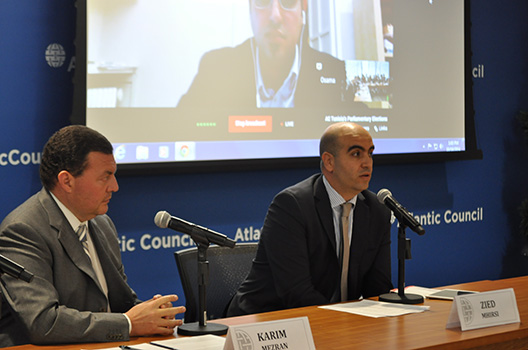 On October 26, Tunisians head to the polls to elect a parliament amid frustration and uncertainty in the transitioning country’s stability. Fear and distrust of political elites, a sluggish economy, high unemployment, and deteriorating security have tempered electoral enthusiasm, raising prospects for low voter turnout. Parliamentary elections, the first since the adoption of the new constitution, are one of several steps that will determine the legitimacy of the new government and its ability to guide the country toward genuine political and economic stability.
On October 26, Tunisians head to the polls to elect a parliament amid frustration and uncertainty in the transitioning country’s stability. Fear and distrust of political elites, a sluggish economy, high unemployment, and deteriorating security have tempered electoral enthusiasm, raising prospects for low voter turnout. Parliamentary elections, the first since the adoption of the new constitution, are one of several steps that will determine the legitimacy of the new government and its ability to guide the country toward genuine political and economic stability.
{soundcloud} https://soundcloud.com/atlanticcouncil/parliamentary-elections-2014-tunisias-political-landscape {/soundcloud}
The Atlantic Council’s Rafik Hariri Center for the Middle East hosted a roundtable event on October 16 to address the challenges ahead, featuring representatives from Tunisia’s two major political parties—Zied Mhirsi, US spokesperson for Nidaa Tounes, and Osama Al Saghir, an Ennahda member of the National Constituent Assembly—and Scott Mastic, director for the Middle East and North Africa at the International Republican Institute. Senior Fellow Karim Mezran moderated the discussion.
Mastic offered a critical assessment of the country’s current political climate following a recent visit to Tunisia. He noted that the public was frustrated and fatigued due to a transition process marred by ambitious promises with minimal results. He highlighted widening distrust of existing political parties, noting that slow voter registration and the public’s tepid reception to campaigning were strong indicators of growing disillusionment with the political process. Whether governing through a coalition or a prominent party achieving a decisive victory, Mastic noted that the economic and political challenges that the next parliament will face are immense, yet surmountable.
Ennahda party representative Al Saghir outlined his party’s commitment to govern by consensus, citing his party’s abstention from the November presidential elections as a sign of the party’s commitment to addressing citizens’ grievances. He affirmed his party’s commitment to a fully functioning democratic system and welcomed the prospect of a coalition government including Islamists, secularists, and technocrats. Al Saghir stressed that his party was arduously working toward driving electoral participation, encouraging Tunisians to vote regardless of which party they support. He noted his party’s primary concern was stabilizing the economy, bringing unemployment to under 12 percent, upgrading the country’s infrastructure, addressing societal divisions, and uniting the citizenry.
Mhirsi touched on Tunisia’s reformist history, noting that the strength of his party was rooted in the inclusion of all sectors of Tunisian society. With more than 100,000 registered members, Mhirsi noted that Nidaa Tounes had the organizational capacity to bring voters out to the polls and also to deliver on its promises. He acknowledged that job growth, ethical governance, anti-corruption, and security sector reform were high priorities of the next government, regardless of the winner, but maintained that Nidaa Tounes was best poised to address and successfully manage these challenges.
